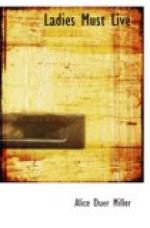Mrs. Lane came to him with the suggestion that he would wish Christine to be one of the patronesses of the next winter’s dances. The list was about to be printed. Max hesitated. “It would be a little premature to put her down as Mrs. Riatt, wouldn’t it?” he objected. Mrs. Lane thought this was merely superstitious, and ordered the cards so printed without consulting him further.
Every one asked him what he heard from her, so that he actually stooped once or twice to invent sentences from imaginary letters of hers. He even went so far as to read the society columns of the New York newspapers, so that he might not be caught in any absurd error about her whereabouts. Such at least is the reason by which he explained his conduct to himself.
He was shocked to find that he was restless and dissatisfied. The only occupation that seemed to give any relief was gambling; or, as a mine-owning friend of his expressed it, in making “a less conservative and more remunerative investment of his capital.” He spent hours every day hanging over the ticker in the office of Burney, Manders and Company—and this young and eager firm of brokers made more money in commissions during the first two weeks of his return than they had during the whole year that preceded it.
On the whole he lost, and Welsley, his mining friend, seeing this began to urge on him more and more the advisability of buying out the majority of stock in a certain Spanish-American gold mine. At first he always made the same answer: “You know as well as I do, Welsley, I would never put a penny into any property I had not inspected.”
But gradually a desire to inspect it grew up in his mind. What would suit his plans better than a long trip, as soon as the breaking of his engagement was announced? A week at sea, two or three days on a river, and then sixty miles on mule-back over the mountains—there at least he would not be troubled by accounts of Christine’s wedding, or assertions that she had looked brilliant at the opera.
He had been at home about two weeks, when her first letter came. So far the only scrap of her handwriting that he possessed was the formal release that she had given him the afternoon they became engaged, and which, for safe keeping doubtless, he always carried in his pocketbook, and which he sometimes found himself reading over—not as a proof that he could get out of his engagement, but rather in an attempt to verify the fact that he had ever got into it.
However unfamiliar with her writing, he had not the least doubt about the letter from the first instant that he saw it. No one else could use such absurd faint blue and white paper and such large square envelopes. As he took it up, he said to himself that it had never occurred to him that she would write, and yet he saw without any sense of inconsistency that he had looked for this letter in every mail. And yet, so perverse is the nature of mankind, that he opened it, not with pleasure, but with a sudden return of all his old terror of being trapped.




